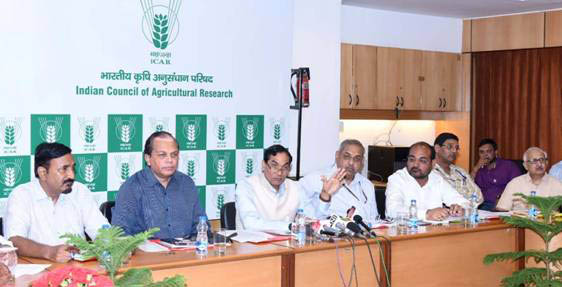If you are finding it easy to breath in Delhi these days, you should thank farmers’ cooperatives of Haryana, Punjab, UP and NCR for that. The reduced air pollution due to check on stubble burning and implemented through co-operatives, is the reason behind an impressive statistic on air-pollution.
Echoing this Trilochan Mohapatra, Director General of ICAR claimed that the year 2018 witnessed massive reduction in crop residue burning incidents. He said it shows that through coordinated public and private efforts such challenges can be addressed effectively.
Readers would recall as we reported earlier in these columns, secretaries of 3,485 cooperative societies across the state of Punjab were put on the job of checking stubble burning in 8000 paddy growing villages of Punjab. The story is same in other states as well.
Addressing media in New Delhi on Tuesday, Mohapatra said that through the various efforts under the Central Sector Scheme on ‘Promotion of Agricultural Mechanization for In-Situ Management of Crop Residue in the State of Punjab, Haryana, Uttar Pradesh & NCT of Delhi’ the paddy residue burning events have reduced by 15% and 41% in 2018 as compared to that in 2017 and 2016.
The Secretary also added that more than 4500 villages in Punjab and Haryana was declared as Zero Stubble Burning Villages during 2018 as not a single crop burning incident was reported from these villages during the year.
Mohapatra stated that the Central Sector Scheme was launched with a total outgo of Rs.1151.80 Crores for the period from 2018-19 to 2019-20 by the Government of India to tackle air pollution and to subsidize machinery required for in-situ management of crop residue in the States of Punjab, Haryana, Uttar Pradesh and NCT of Delhi.
Within one year of its implementation utilizing an amount of Rs. 500 crore, the happy seeder/zero tillage technology was adopted in 8 lakh hectares of land in the North- Western States of India.
Under the scheme, financial assistance @50% of the cost is provided to the farmers for purchase of in-situ crop residue management machines on individual ownership basis. The financial assistance for establishment of Custom Hiring Centres of in-situ crop residue management machinery is @ 80% of the project cost.
ICAR is implementing the scheme through 60 Krishi Vigyan Kendras (KVKs) spread in the states of Punjab, Haryana, Delhi and UP, who in turn coordinate with farmers co-ops. In this scheme, awareness campaigns were conducted by organizing 1000s of demonstrations, putting up hoardings, banners and wall paintings all across the States.
Massive awareness programs at village levels, Kisan Ghostis, Kisan Melas and sensitizing school children were highlights of the campaign.
in collaboration with State departments and agricultural universities. More than 2 lakh stakeholders were sensitized during one year. More than 400 hands-on training were organized and 18,000 farmers, tractor owner and machine operators were trained.
